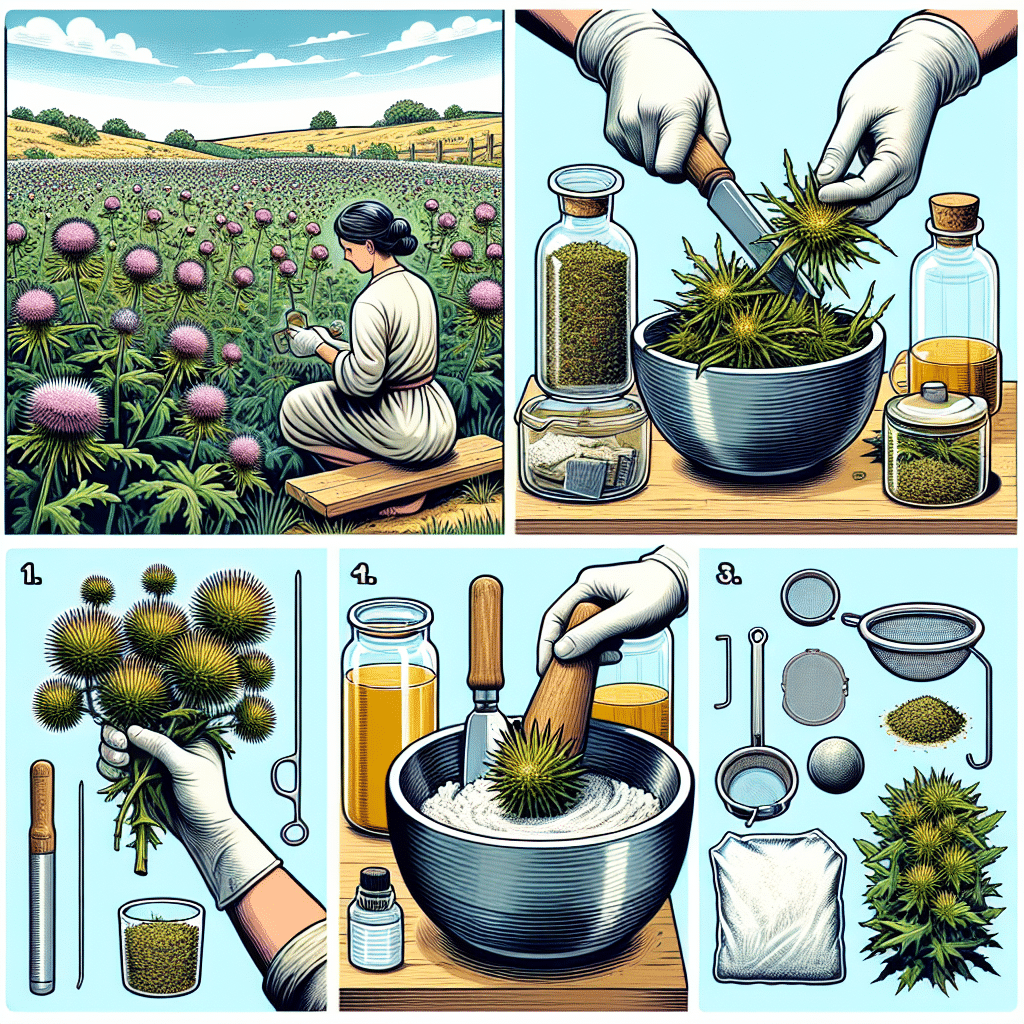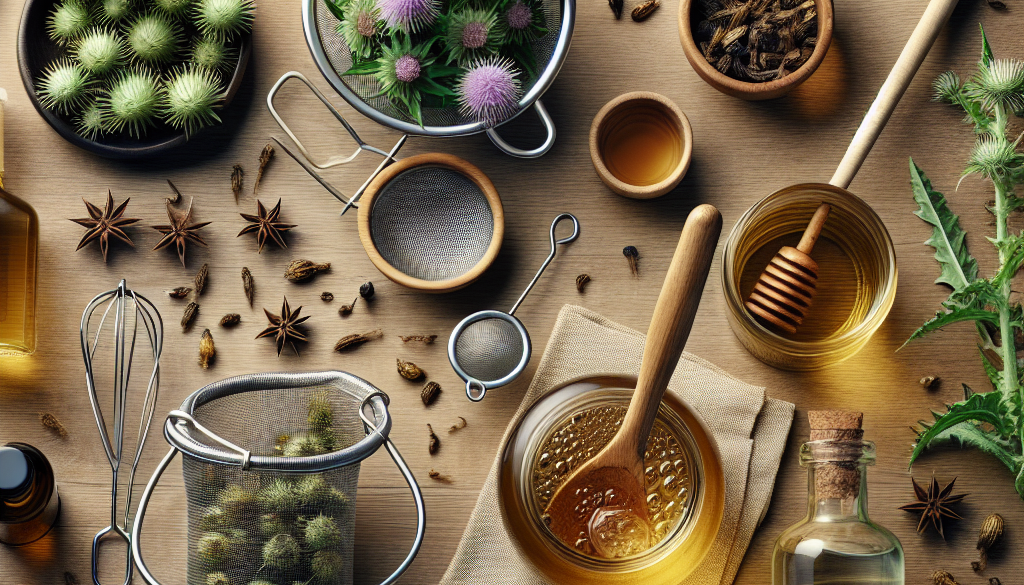DIY Milk Thistle Extract: Guide
-
Table of Contents
- DIY Milk Thistle Extract: A Comprehensive Guide
- Understanding Milk Thistle and Its Benefits
- Harvesting Milk Thistle for Extraction
- Preparing Milk Thistle Seeds for Extraction
- Choosing Your Extraction Method
- Alcohol Extraction (Tincture)
- Water Extraction (Tea)
- Using Your Milk Thistle Extract
- Potential Side Effects and Considerations
- Conclusion: Embracing Natural Liver Health
- Discover ETChem’s Protein Products
DIY Milk Thistle Extract: A Comprehensive Guide

Milk thistle, scientifically known as Silybum marianum, has been used for centuries as a natural remedy for a variety of ailments, particularly liver problems. The active ingredient in milk thistle, silymarin, is a group of compounds said to have antioxidant and anti-inflammatory properties. Making your own milk thistle extract can be a rewarding process, allowing you to harness these benefits at home. This guide will walk you through the steps to create your own extract, as well as discuss the potential health benefits and uses of milk thistle.
Understanding Milk Thistle and Its Benefits
Milk thistle is a flowering herb related to the daisy and ragweed family. It is native to Mediterranean countries, but it is now found throughout the world. The plant’s seeds contain a complex of flavonolignans collectively known as silymarin, which is thought to be the source of its medicinal properties.
- Antioxidant Effects: Silymarin acts as an antioxidant, protecting cells from damage caused by free radicals.
- Liver Health: Milk thistle is best known for its protective effects on the liver, helping to repair liver cells damaged by alcohol or toxins.
- Anti-inflammatory Properties: It may also help reduce inflammation, which is beneficial for those with liver disease.
While research is ongoing, milk thistle is commonly used as a complementary therapy for people with liver diseases such as cirrhosis, jaundice, hepatitis, and gallbladder disorders.
Harvesting Milk Thistle for Extraction
Before you can make an extract, you need to source your milk thistle. You can grow your own, purchase seeds from a health food store, or find them in the wild. If you’re harvesting milk thistle yourself, it’s important to correctly identify the plant and harvest the seeds when they are ripe.
- Look for the distinctive purple flower and white-veined leaves.
- Harvest the seeds in late summer or early fall when the flower heads have dried.
- Wear gloves to protect your hands from the spiky parts of the plant.
- Cut the flower heads and place them in a paper bag to dry further and release the seeds.
Preparing Milk Thistle Seeds for Extraction
Once you have your seeds, they need to be prepared for extraction. This involves cleaning and crushing the seeds to increase the surface area for extraction.
- Separate the seeds from any plant debris.
- Use a coffee grinder or mortar and pestle to crush the seeds into a coarse powder.
- Store the crushed seeds in an airtight container if not using immediately.
Choosing Your Extraction Method
There are several methods for extracting the beneficial compounds from milk thistle seeds. The most common methods are alcohol extraction (tincture) and water extraction (tea).
Alcohol Extraction (Tincture)
Alcohol is an effective solvent for silymarin and creates a potent tincture.
- Combine the crushed seeds with high-proof alcohol (like vodka) in a glass jar.
- The ratio should be approximately 1 part seeds to 3 parts alcohol.
- Seal the jar and store it in a cool, dark place for about 4-6 weeks, shaking it daily.
- After the infusion period, strain the mixture through a cheesecloth or fine mesh strainer.
- Store the tincture in a dark glass dropper bottle for easy use.
Water Extraction (Tea)
If you prefer a non-alcoholic extract, you can make a milk thistle tea.
- Boil water and pour it over the crushed seeds.
- Use about one tablespoon of seeds per cup of water.
- Let the tea steep for 15-20 minutes before straining.
- Drink the tea immediately or store it in the refrigerator for up to two days.
Using Your Milk Thistle Extract
Once you have your extract, it can be used in various ways. Tinctures can be taken directly under the tongue or diluted in water. Teas can be enjoyed warm or cold. The recommended dosage varies, but it’s important to start with a small amount to see how your body reacts before increasing the dose.
Potential Side Effects and Considerations
While milk thistle is generally considered safe, it can have potential side effects or interact with certain medications. Always consult with a healthcare provider before starting any new supplement, especially if you have a medical condition or are taking medications.
- Common side effects may include gastrointestinal issues such as diarrhea, nausea, and bloating.
- People with allergies to plants in the same family as milk thistle should avoid it.
- Pregnant or breastfeeding women should consult a doctor before using milk thistle.
Conclusion: Embracing Natural Liver Health
Making your own milk thistle extract is a simple and natural way to potentially boost your liver health and take advantage of the antioxidant properties of this ancient herb. Whether you choose to make a tincture or tea, the process can be a satisfying addition to your wellness routine. Remember to source high-quality seeds, prepare them properly, and consult with a healthcare provider to ensure it’s right for you.
Discover ETChem’s Protein Products
If you’re interested in exploring more natural health solutions, consider ETChem’s range of protein products. ETChem is a reputable Chinese Collagen factory manufacturer and supplier, offering high-quality collagens such as marine, fish, bovine, chicken, type I, II, and III. Their products are perfect for various industries, including nutraceuticals, pharmaceuticals, cosmeceuticals, veterinary, and food and beverage. With a neutral taste and instant solubility, ETChem’s collagens are an excellent choice for those looking to enhance their health and wellness regimen.
About ETChem:
ETChem, a reputable Chinese Collagen factory manufacturer and supplier, is renowned for producing, stocking, exporting, and delivering the highest quality collagens. They include marine collagen, fish collagen, bovine collagen, chicken collagen, type I collagen, type II collagen and type III collagen etc. Their offerings, characterized by a neutral taste, instant solubility attributes, cater to a diverse range of industries. They serve nutraceutical, pharmaceutical, cosmeceutical, veterinary, as well as food and beverage finished product distributors, traders, and manufacturers across Europe, USA, Canada, Australia, Thailand, Japan, Korea, Brazil, and Chile, among others.
ETChem specialization includes exporting and delivering tailor-made collagen powder and finished collagen nutritional supplements. Their extensive product range covers sectors like Food and Beverage, Sports Nutrition, Weight Management, Dietary Supplements, Health and Wellness Products, ensuring comprehensive solutions to meet all your protein needs.
As a trusted company by leading global food and beverage brands and Fortune 500 companies, ETChem reinforces China’s reputation in the global arena. For more information or to sample their products, please contact them and email karen(at)et-chem.com today.




